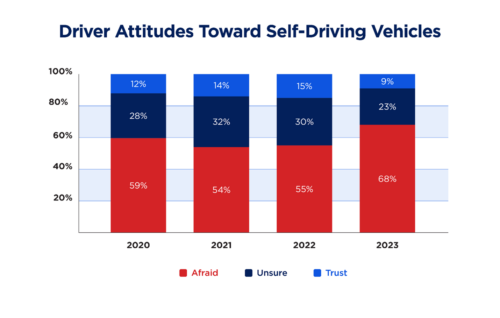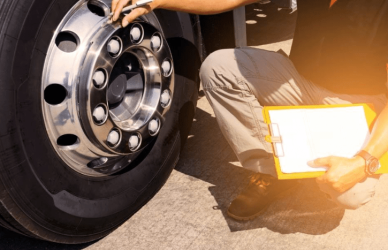Americans are growing more fearful of self-driving vehicles, a new AAA survey reveals. In contrast to the 55% who indicated that they were afraid last year, 68% now express discomfort with driverless cars. The shift in sentiment indicates an increased level of apprehension among Americans towards this quickly advancing technology.
“We were not expecting such a dramatic decline in trust from previous years,” Greg Brannon, director of automotive research for AAA, said in a statement. “Although with the number of high-profile crashes that have occurred from overreliance on current vehicle technologies, this isn’t entirely surprising.”

AAA’s recent survey has shed light on the public confusion surrounding self-driving vehicles. Surprisingly, one in ten drivers said they believed a vehicle exists that is so advanced it can drive its passengers while they sleep – yet no such technology currently exists in the marketplace today.
Despite the plethora of cutting-edge vehicle systems like Autopilot, ProPILOT, and Pilot Assist on the market today, AAA research shows that more than one in five Americans have a false assumption about their level of autonomy. While these advanced self-driving technologies help with steering or speed control to make driving less strenuous for human drivers; they are not yet capable of independently operating vehicles without any driver supervision. Currently, no such technology is available to the general public.
Despite fears surrounding autonomous driving, a recent survey has revealed that the majority of Americans are open to some advanced technologies in their vehicles. 60% polled said they would welcome features like blind spot warnings, adaptive cruise control, and automatic emergency braking with open arms.
Misunderstanding and misuse of some of these assistive technologies has led to crashes, some of which are fatal, further increasing the fear of this type of technology, which is understandable since some of the technology names can be a bit misleading. For example, Tesla’s Autopilot feature is not meant to be engaged without human supervision. The feature is meant to assist, not take the lead, and this misconception has led to a number of incidents.
The Owner-Operator Independent Drivers Association (OOIDA) has expressed alarm over Tesla’s Full Self-Driving system, citing an apparent disconnect between the name and its functionality. In a letter to the National Highway Traffic Safety Administration (NHTSA), OOIDA warned that this confusion could lead to dangerous consequences for all road users, including truckers.
“The use of unfinished and unproven automated technologies poses a significant threat to small-business truckers, and we urge you to take action to protect all road users and promote greater transparency and oversight of their development,” OOIDA President Todd Spencer wrote
Source: Land Line








